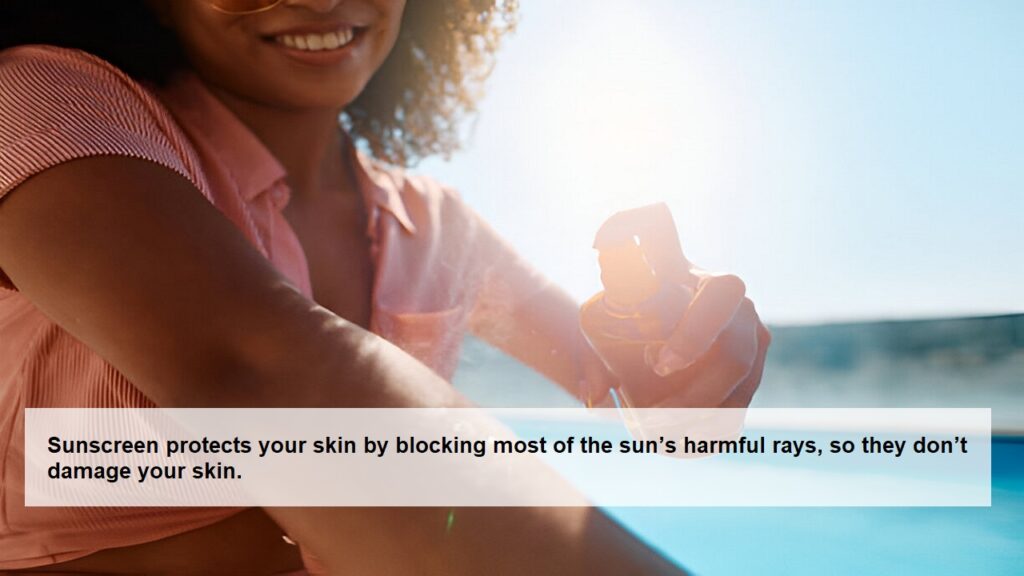The idea that sunscreen can stop your skin from getting darker in the sun is a popular misconception, especially in Nigeria where the sun doesn’t joke.
Yes, melanin in darker skin does offer some natural protection, but it’s not enough on its own. That’s why using sunscreen is still essential for protecting your skin from UV damage, even if you rarely burn.
What Does Sunscreen Actually Do?
The point of sunscreen isn’t to block your skin from darkening in the sun; it’s to block the skin damage caused by the sun. And trust us, that’s the real win.
Sunscreen is a protective shield between your skin and the sun’s powerful rays. It works by either absorbing UV rays (chemical sunscreens) or reflecting them (physical sunscreens). Both protect your skin from sunburn, early ageing, and skin cancer.
But let’s be clear: no sunscreen blocks 100% of UV radiation. Even high SPF lets a small amount through.
So, does sunscreen prevent you from tanning entirely? No. But it does drastically cut down the amount of UV your skin soaks up — which makes tanning slower and a lot safer.
Can You Still Get Tan While Wearing Sunscreen?
Absolutely — and you probably will. Your sunscreen filters the sun, but doesn’t cancel it out completely.
Even the best sunscreen doesn’t block all UV rays. For example, SPF 50 blocks about 98% of UVB rays, but the remaining 2% can still darken your skin under the sun.
So, does sunscreen prevent you from tanning completely? Not at all. It slows the tanning process and helps avoid extreme or uneven tanning, especially in areas like the face, shoulders, or forehead that get hit by sun more often.
For some people in Western countries, where tanning is a beauty trend, the goal is a slow, even tan. That’s exactly what sunscreen helps you achieve: a healthy glow without harming your skin’s health.
What Are the Risks of Tanning Without Sunscreen?
A lot of us grew up hearing things like, “Black don’t crack,” or “Sun no dey worry black man.” But let’s set the record straight: sun damage doesn’t care about your skin tone.
When you stay under the sun too long without sunscreen, you’re exposing your skin to UVA and UVB rays with no protection. The short-term result? Sunburn. The long-term result? Skin that will humble you.
Some of the risks include:
- Sunburn: Yes, darker skin can burn. It just might not turn bright red — it could feel tight, dry, sting, or even peel.
- Hyperpigmentation: Sun exposure can trigger dark patches and uneven tone, especially around the cheeks and forehead. These are often harder to treat on melanin-rich skin.
- Photoaging: Long exposures to the sun (tanning) can cause wrinkles, fine lines, sagging, and dullness, often before they’re supposed to show up.
- Skin cancer: Rare but real. Even people with brown or black skin can develop melanoma, often in areas like the soles of the feet or palms — places we rarely check.
So even though wearing sunscreen doesn’t prevent tanning completely, it helps prevent all the nasty side effects that come with unprotected sun exposure.
How to Stay Safe in the Sun
In a place like Nigeria, your skin is constantly under fire from the sun-wise. That’s why wearing sunscreen daily is a big deal.
Over time, sun exposure adds up like Lagos traffic — slowly but surely. Less UV means less damage, fewer wrinkles, and a lower risk of cancer.
Go for broad-spectrum sunscreen with SPF 30 or higher. And yes, does sunscreen prevent tanning? Not completely. But your skin will thank you for using it.
Recommended Sunscreen for Nigerian Skin
Not all sunscreens are made with our climate or skin types in mind. Many leave a white cast, feel greasy, or clog pores. That’s we’ve put together a list of the best sunscreens for Nigeria’s hot weather:
- Anua Heartleaf Silky Moisture Sunscreen 50ml
- Haru haru Black Rice Moisture Airyfit Daily Sunscreen – 50ml
- Missha All Around Safe Block Aqua Sun Gel Sunscreen – Spf 50 New Look
- Estelin Ultra Light Hydrating Invisible Sunscreen SPF 80 Pa+++- 100g
- Bondi Sands SPF 50+ Sunscreen Mist 79ml
And yes, you can get them at affordable prices, delivered to you anywhere in Nigeria.
When to Apply Sunscreen for Optimal Protection
For sunscreen to actually work, you need to use it properly. Apply it at least 30 minutes before you go outside. This gives it time to bind with your skin.
Reapply every two hours, or more often if you’re swimming, sweating, or wiping your face. Because what’s the point of using it once if you’re going to sweat it off in 15 minutes?
As long as you apply it right, sunscreen lets you enjoy the sun — with fewer regrets.
And in Nigerian climates, where the sun is intense even during the rainy season, you need sunscreen to protect your skin every single day.


